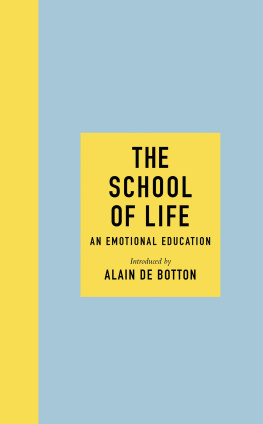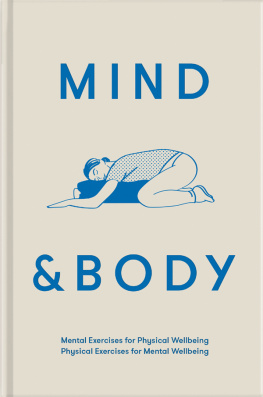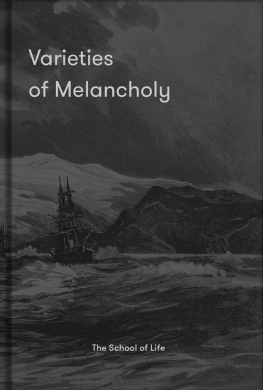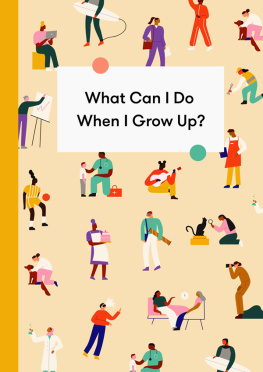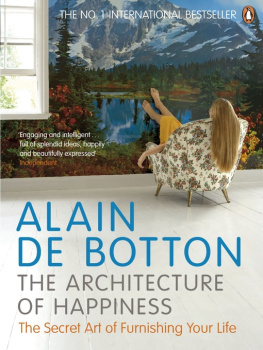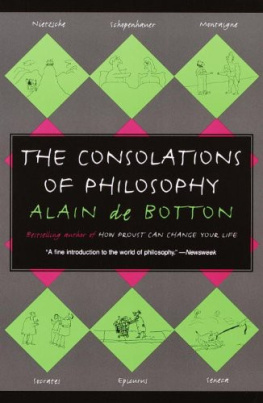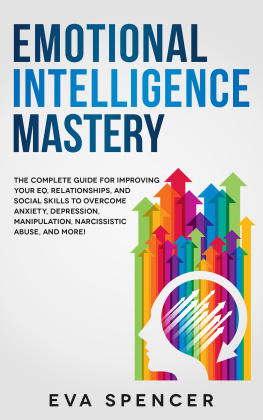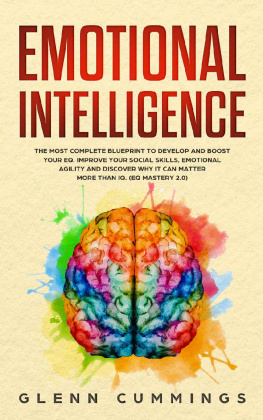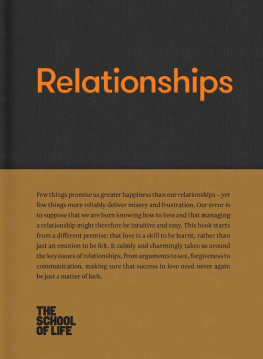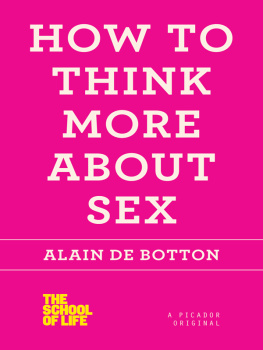About the Author
The School of Life is a collective of psychologists, philosophers and writers operating under a common brand. This is an anthology of its best writings produced over the previous ten years.
Alain de Botton, the author of the introduction, is a writer, the author of fifteen books including The Consolations of Philosophy and The Course of Love. He is one of the founders of The School of Life.
Introduced by Alain de Botton
THE SCHOOL OF LIFE
An Emotional Education

PENGUIN BOOKS
UK | USA | Canada | Ireland | Australia
India | New Zealand | South Africa
Penguin Books is part of the Penguin Random House group of companies whose addresses can be found at global.penguinrandomhouse.com

First published 2019
Copyright The School of Life, 2019
This is an anthology of materials drawn from the work of The School of Life Press and The School of Life Blog (www.theschooloflife.com/thebookoflife). These materials have previously been, and may continue to be, published or otherwise made available elsewhere by the copyright holder.
The right of Alain de Botton to be identified as the author of the introduction of this work has been asserted by him in accordance with the Copyright, Designs and Patents Act 1988.
The permissions on constitute an extension of this copyright page.
The passage referencing Bernard Mandeville on appeared in a slightly different form in Alain de Bottons Status Anxiety (Penguin, 2004) and is included here with full permission.
ISBN: 978-0-241-98585-4
This ebook is copyright material and must not be copied, reproduced, transferred, distributed, leased, licensed or publicly performed or used in any way except as specifically permitted in writing by the publishers, as allowed under the terms and conditions under which it was purchased or as strictly permitted by applicable copyright law. Any unauthorized distribution or use of this text may be a direct infringement of the authors and publishers rights and those responsible may be liable in law accordingly.
Introduction
EDUCATION
Modern societies are collectively deeply committed to education, and have in place the mechanisms needed to teach every conceivable profession and to cover every topic of enquiry. We reliably educate pilots and neurosurgeons, actuaries and dental hygienists; we offer lessons in the irregularities of the French pluperfect and textbooks on the conductive properties of metal alloys. We are not individually much cleverer than the average animal, a heron or a mole, but the knack of our species lies in our capacity to transmit our accumulated knowledge down the generations. The slowest among us can, in a few hours, pick up ideas that it took a few rare geniuses a lifetime to acquire.
Yet what is distinctive is just how selective we are about the topics we deem it possible to educate ourselves in. Our energies are overwhelmingly directed towards material, scientific and technical subjects and away from psychological and emotional ones. Much anxiety surrounds the question of how good the next generation will be at maths; very little around their abilities at marriage or kindness. We devote inordinate hours to learning about tectonic plates and cloud formations, and relatively few fathoming shame and rage.
The assumption is that emotional insight might be either unnecessary or in essence unteachable, lying beyond reason or method, an unreproducible phenomenon best abandoned to individual instinct and intuition. We are left to find our own path around our unfeasibly complicated minds a move as striking (and as wise) as suggesting that each generation should rediscover the laws of physics by themselves.
ROMANTICISM
That we think so well of untrained intuition is because (perhaps without realizing it) we are the troubled inheritors of what can be defined as a Romantic view of emotions. Starting in Europe in the eighteenth century and spreading widely and powerfully ever since, Romanticism has been deeply committed to casting doubt on the need to apply reason to emotional life, preferring to let spontaneous feelings play an unhampered role instead.
In our choice of whom to marry, Romanticism has counselled that we be guided by immediate attraction. In our working lives, we are prompted to choose our jobs by listening to our hearts. We are, above all else, urged never to think too much lest cold reason overwhelm the wisdom of feeling.
The results of a Romantic philosophy are everywhere to see: exponential progress in the material and technological fields combined with perplexing stasis in the psychological one. We are as clever with our machines and technologies as we are simple-minded in the management of our emotions. We are, in terms of wisdom, little more advanced than the ancient Sumerians or the Picts. We have the technology of an advanced civilization balancing precariously on an emotional base that has not developed much since we dwelt in caves. We have the appetites and destructive furies of primitive primates who have come into possession of thermonuclear warheads.
EMOTIONAL INTELLIGENCE
Emotional intelligence remains a peculiar-sounding term, because we are wedded to thinking of intelligence as a unitary capacity, rather than what it actually is: a catch-all word for what is in fact a range of skills directed at a number of different challenges. There is mathematical intelligence and culinary intelligence, intelligence around literature and intelligence towards animals. What is certain is that there is no such thing as an intelligent person per se and probably no entirely dumb one either. We are all astonishingly capable of messing up our lives, whatever the prestige of our university degrees, and are never beyond making a sincere contribution, however unorthodox our qualifications.
When we speak of emotional intelligence, we are alluding in a humanistic rather than scientific way to whether someone understands key components of emotional functioning. We are referring to their ability to introspect and communicate, to read the moods of others, to relate with patience, charity and imagination to the less edifying moments of those around them. The emotionally intelligent person knows that love is a skill, not a feeling, and will require trust, vulnerability, generosity, humour, sexual understanding and selective resignation. The emotionally intelligent person awards themselves the time to determine what gives their working life meaning and has the confidence and tenacity to try to find an accommodation between their inner priorities and the demands of the world. The emotionally intelligent person knows how to hope and be grateful, while remaining steadfast before the essentially tragic structure of existence. The emotionally intelligent person knows that they will only ever be mentally healthy in a few areas and at certain moments, but is committed to fathoming their inadequacies and warning others of them in good time, with apology and charm.
Sustained shortfalls in emotional intelligence are, sadly, no minor matter. There are few catastrophes, in our own lives or in those of nations, that do not ultimately have their origins in emotional ignorance.
SECULARIZATION
For most of human history, emotional intelligence was broadly in the hands of religions. It was they that talked with greatest authority about ethics, meaning, community and purpose. It was they that offered to instruct us in how to live, love and die well. Religions were natural points of reference at times of personal crisis; in agony, one generally called first for the priest.

